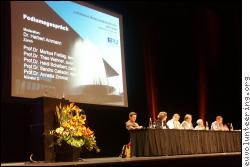Background
 EUV in Lucerne, Switzerland |
Volunteer work between freedom and professionalism"
"Our society is based on civic engagement. Voluntary travil constantly influences our lives. Voluntary work should not be directed or forced by economic considerations, "said Adolf Ogi, former Federal Councillor of Switzerland during his welcome speech at the EUV held in Lucerne, Switzerland in 2005.
The International Year of Volunteers 2011 marks the end of a decade during which a lot of progress has been made in the field of research related to volunteerism. Particular progress is related to the variety of research disciplines looking into issues connected to volunteering. In particular, the statistical assessment of volunteer work has been significantly improved and thus a basis for further research has been created. In addition, both state and private initiatives have contributed to the promotion of volunteerism and sharing conferences have led to an increased exchange between research and practice.
Likewise, the perception of volunteers and their management has changed within non-profit organizations. Frequently expressed reasons for this are professional trends, recruitment difficulties, increased expectations of volunteers and changed service offerings. While many places complain about a decline of volunteers, there is an increase in commitment elsewhere. Tensions arising between paid staff and volunteers, especially in the social care sector (and elsewhere) were studied, looking at fears of employees with regards to the reduction of jobs, on one hand, and overload of volunteers, on the other hand. These have both been identified as challenges for the successful design of volunteer programs. There are fears among employees to be replaced by "cheap" volunteers. These were in the past encouraged by government initiatives, in order to stimulate the labor market through volunteer work or even mandatory volunteering. Volunteering is identity-fostering in society and is seen as a way to promote cohesion and exchange in a multicultural society. In the last ten years, the economy has appreciated volunteer work as a valuable means in various business areas, such as personnel management, corporate communications or corporate social responsibly. What used to primarily be the responsibility of individual employees and their free will, is today – at least in big companies – used as a strategic means for staff retention and values or the local community. Corporate volunteering therefore appears at first glance to be a win-win situation for companies and NPOs. However, this affirmation still largely lacks scientific evidence.
These developments make it clear that volunteering is today in a tension field between professionalization, on the one hand, and freedom, on the other hand.
Origin of the EUV
The European University of Voluntary Service (UEV) was founded as an “itinerant” University in 1993 during a plenary session of the member organizations of A.V.E. (Association pour le voluntariat à l’ Acte Gratuit en Europe) in co-operation with representatives of Universities in Belgium, France, Germany, Italy and Portugal after about 20 years of A.V.E. foundation. A.V.E. at that time was a member of IAVE (International Association for Volunteer Effort) and had a special role inside IAVE to promote and to qualify volunteering in Europe.
The UEV was registered and organized by Albert Coupé, Professor of Economy of the University of Brussels, ex-Minister of Labour of Belgium and ex-Commissioner for Belgium of the Common European Market. Prof. Coupé died at the age of 92 in 1999, having co-operated with Robert Schumann in the creation of the European Common Market.
Functioning and Organization
“The UEV (The European University of Voluntary Service) is an institution created by A.V.E. which was inspired by traditional medieval universities, where professors from different countries would meet to share and spread knowledge of their respective cultures. In this universal spirit, UEV attempts to strengthen the links between volunteers coming from the different countries within the European Union, the Eurpean Council and those from other parts who wish to participate in the seminars and workshops.”
This very special University is apolitical, non-confessionally organized, multicultural, and, inspired by the medieval ones; it is itinerant. That means that all sessions or meetings occur in several locations and do not remain in one city of at one local University with different faculties. Indeed this uniqueness gives the UEV the opportunity to hold its sessions in various countries with different participants, several teachers and professors, and also to make contact with local voluntary projects and new ideas regarding voluntary activities.
New Name
At the General Assembly in September 2013, the Conference title was changed from "European University for Voluntary Service" to "European University for Volunteering", in order to include the whole spectrum of volunteer activities.
References
- Ammann, H. (2010). Freiwilligen-Monitor 2010 - Ein wissenschaftlicher und politischer Diskurs, in: Fachzeitschrift für Verbands- und Nonprofit-Management, 36, 3, 16-27.
- Helmig, B., Bärlocher, Ch. & von Schnurbein, G. (2009). Defining the Nonprofit Sector: Switzerland, Working Papers of the Johns Hopkins Nonprofit Comparative Sector Project, Nr. 46, Baltimore: The Johns Hopkins Center for Civil Society.
- Schumacher, B. (2010). Freiwillig verpflichtet: Gemeinnütziges Denken und Handeln in der Schweiz seit 1800, Zürich: Verlag Neue Züricher Zeitung.
- Stadelmann-Steffen, I., Traunmüller, R., Gundelach, B. & Freitag, M. (2010). Freiwilligen-Monitor Schweiz 2010, Zürich: Seismo.
- Wehner, T., Mieg, H. & Güntert, S. (2006). Frei-gemeinnützige Arbeit: Einschätzungen und Befunde aus arbeits- und organisationspsychologischer Perspektive, in: Mühlpfordt, S. & Richter, P., Ehrenamt und Erwerbsarbeit München: Hampp, 19-39.